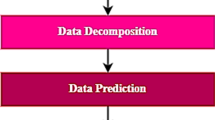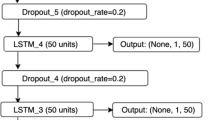Abstract
This paper proposes a novel short-term building load forecasting approach under the framework of patch learning, a novel data-driven model that aggregates a global model and several patch models to further reduce forecasting errors. A PL-LSTM-SVR model is hereby employed to address such a time-series based forecasting problem, where the long short-term memory network is considered as the global model and the support vector regression is selected as the patch model. To obtain satisfying performances, an infinity norm measurement is selected to evaluate load forecasting errors and identify patch locations. Furthermore, a genetic algorithm with elitist preservation strategy is introduced for hyperparameter tuning. The performances of the proposed PL-LSTM-SVR model are tested and verified on two different data sets, and compared with four advanced building load forecasting models on several common metrics.
Access this chapter
Tax calculation will be finalised at checkout
Purchases are for personal use only
Similar content being viewed by others
References
Baldwin, A.N., Loveday, D.L., Li, B., Murray, M., Yu, W.: A research agenda for the retrofitting of residential buildings in china - a case study. Energy Policy 113, 41–51 (2018). https://doi.org/10.1016/j.enpol.2017.10.056
Bishop, C.M.: Neural Networks for Pattern Recognition. Oxford University Press, New York (1995)
BP: bp energy outlook: 2020 edition (2020)
Bui, D.K., Nguyen, T.N., Ngo, T.D., Nguyen-Xuan, H.: An artificial neural network (ANN) expert system enhanced with the electromagnetism-based firefly algorithm (EFA) for predicting the energy consumption in buildings. Energy 190, 116370 (2020). https://doi.org/10.1016/j.energy.2019.116370
Chaouachi, A., Kamel, R.M., Andoulsi, R., Nagasaka, K.: Multiobjective intelligent energy management for a microgrid. IEEE Trans. Industr. Electron. 60(4), 1688–1699 (2013). https://doi.org/10.1109/TIE.2012.2188873
Chitalia, G., Pipattanasomporn, M., Garg, V., Rahman, S.: Robust short-term electrical load forecasting framework for commercial buildings using deep recurrent neural networks. Appl. Energy 278, 115–410 (2020). https://doi.org/10.1016/j.apenergy.2020.115410
Dong, B., Li, Z., Rahman, S.M., Vega, R.: A hybrid model approach for forecasting future residential electricity consumption. Energy Build. 117, 341–351 (2016). https://doi.org/10.1016/j.enbuild.2015.09.033
Fan, C., Wang, J., Gang, W., Li, S.: Assessment of deep recurrent neural network-based strategies for short-term building energy predictions. Appl. Energy 236, 700–710 (2019). https://doi.org/10.1016/j.apenergy.2018.12.004
Holland, J.H.: An introductory analysis with applications to biology, control, and artificial intelligence. In: Adaptation in Natural and Artificial Systems. University of Michigan Press, Ann Arbor (1975)
IEA: Buildings (2020)
Kim, Y., Gu Son, H., Kim, S.: Short term electricity load forecasting for institutional buildings. Energy Rep. 5, 1270–1280 (2019). https://doi.org/10.1016/j.egyr.2019.08.086
LeCun, Y., Bengio, Y., Hinton, G.: Deep learning. Nature (2015). https://doi.org/10.1038/nature14539
Li, K., Xie, X., Xue, W., Dai, X., Chen, X., Yang, X.: A hybrid teaching-learning artificial neural network for building electrical energy consumption prediction. Energy Build. 174, 323–334 (2018). https://doi.org/10.1016/j.enbuild.2018.06.017
Liu, G., Li, X., Tan, Y., Zhang, G.: Building green retrofit in China: policies, barriers and recommendations. Energy Policy 139, 111356 (2020). https://doi.org/10.1016/j.enpol.2020.111356
Massaoudi, M., Refaat, S.S., Chihi, I., Trabelsi, M., Oueslati, F.S., Abu-Rub, H.: A novel stacked generalization ensemble-based hybrid LGBM-XGB-MLP model for short-term load forecasting. Energy 214, 118874 (2021). https://doi.org/10.1016/j.energy.2020.118874
Mat Daut, M.A., Hassan, M.Y., Abdullah, H., Rahman, H.A., Abdullah, M.P., Hussin, F.: Building electrical energy consumption forecasting analysis using conventional and artificial intelligence methods: a review. Renew. Sustain. Energy Rev. 70, 1108–1118 (2017). https://doi.org/10.1016/j.rser.2016.12.015
Rosenow, J., Cowart, R., Bayer, E., Fabbri, M.: Assessing the European union’s energy efficiency policy: will the winter package deliver on ‘efficiency first’? Energy Res. Soc. Sci. 26, 72–79 (2017). https://doi.org/10.1016/j.erss.2017.01.022
Smola, A.J., Schlkopf, B.: A tutorial on support vector regression. Stat. Comput. 14(3), 199–222 (2004)
Somu, N., Gauthama Raman, M.R., Ramamritham, K.: A hybrid model for building energy consumption forecasting using long short term memory networks. Appl. Energy 261, 114131 (2020). https://doi.org/10.1016/j.apenergy.2019.114131
Sun, Y., Haghighat, F., Fung, B.C.: A review of the-state-of-the-art in data-driven approaches for building energy prediction. Energy Build. 221, 110022 (2020). https://doi.org/10.1016/j.enbuild.2020.110022
Tran, D.H., Luong, D.L., Chou, J.S.: Nature-inspired metaheuristic ensemble model for forecasting energy consumption in residential buildings. Energy 191, 116552 (2020). https://doi.org/10.1016/j.energy.2019.116552
Wang, R., Lu, S., Feng, W.: A novel improved model for building energy consumption prediction based on model integration. Appl. Energy 262, 114561 (2020). https://doi.org/10.1016/j.apenergy.2020.114561
Wang, Z., Wang, Y., Zeng, R., Srinivasan, R.S., Ahrentzen, S.: Random forest based hourly building energy prediction. Energy Build. 171, 11–25 (2018). https://doi.org/10.1016/j.enbuild.2018.04.008
Wen, L., Zhou, K., Yang, S.: Load demand forecasting of residential buildings using a deep learning model. Electr. Power Syst. Res. 179, 106073 (2020). https://doi.org/10.1016/j.epsr.2019.106073
Wu, D., Mendel, J.M.: Patch learning. IEEE Trans. Fuzzy Syst. 28(9), 1996–2008 (2020)
Yuan, Z., Wang, W., Wang, H., Mizzi, S.: Combination of cuckoo search and wavelet neural network for midterm building energy forecast. Energy 202, 117728 (2020). https://doi.org/10.1016/j.energy.2020.117728
Zhang, F., Deb, C., Lee, S.E., Yang, J., Shah, K.W.: Time series forecasting for building energy consumption using weighted support vector regression with differential evolution optimization technique. Energy Build. 126, 94–103 (2016). https://doi.org/10.1016/j.enbuild.2016.05.028
Zhong, H., Wang, J., Jia, H., Mu, Y., Lv, S.: Vector field-based support vector regression for building energy consumption prediction. Appl. Energy 242, 403–414 (2019). https://doi.org/10.1016/j.apenergy.2019.03.078
Zhou, Z.H.: Ensemble Methods: Foundations and Algorithms. CRC Press (2012). https://doi.org/10.1201/b12207
Acknowledgement
This research is supported by the National Nature Science Foundation of China [grant numbers 61803162].
Author information
Authors and Affiliations
Corresponding author
Editor information
Editors and Affiliations
Rights and permissions
Copyright information
© 2021 Springer Nature Singapore Pte Ltd.
About this paper
Cite this paper
Dan, Z., Wang, B., Fan, H., Liu, L. (2021). Short-Term Building Load Forecast Based on Patch Learning with Long Short-Term Memory Network and Support Vector Regression. In: Zhang, H., Yang, Z., Zhang, Z., Wu, Z., Hao, T. (eds) Neural Computing for Advanced Applications. NCAA 2021. Communications in Computer and Information Science, vol 1449. Springer, Singapore. https://doi.org/10.1007/978-981-16-5188-5_53
Download citation
DOI: https://doi.org/10.1007/978-981-16-5188-5_53
Published:
Publisher Name: Springer, Singapore
Print ISBN: 978-981-16-5187-8
Online ISBN: 978-981-16-5188-5
eBook Packages: Computer ScienceComputer Science (R0)




